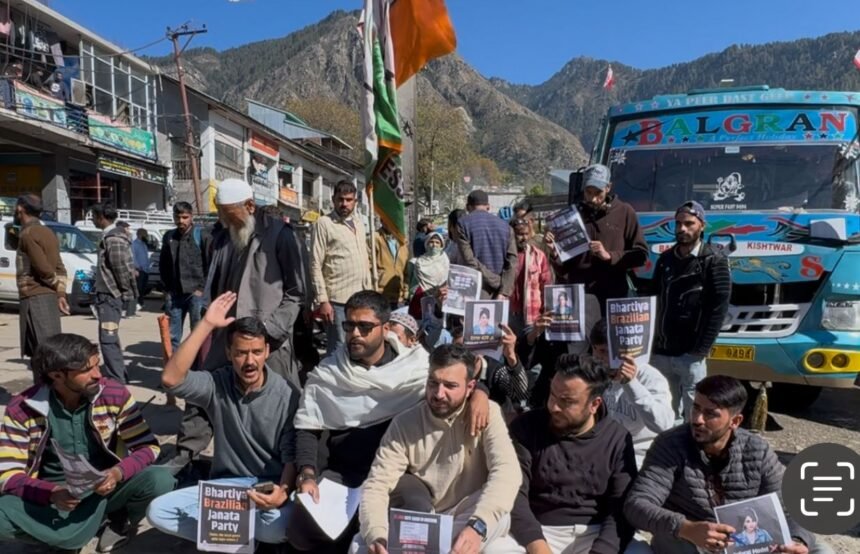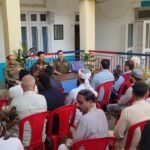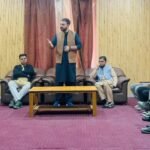Asif Iqbal Naik
Jammu, November 7, 2025 – In a forceful expression of democratic dissent, the District Youth Congress (DYC) Kishtwar staged a major street protest titled “Vote Chori” (Vote Theft) on Thursday, leveling serious allegations of irregularities and institutional bias against the Election Commission of India (ECI).

The protest, organized as a segment of the nationwide campaign launched by the Indian Youth Congress (IYC), reflects a growing political confrontation regarding the credibility of the electoral process.
Protest Marches Through Main Streets
Under the direct supervision of IYC Incharge for the region, Shri Maan Singh Rathore, and Co-Incharge Smt. Harneet Kaur, the demonstration witnessed enthusiastic participation. A large contingent of Youth Congress workers, local leaders, and supporters marched through the main thoroughfares of Kishtwar.
Carrying banners and shouting charged slogans, the protesters demanded immediate action from the poll body. The primary slogan, “Bachao Loktantra, Rokho Vote Chori” (Save Democracy, Stop Vote Theft), highlighted the gravity of their concerns.
“The Election Commission was once seen as a guardian of democracy, but today, its neutrality is under question. We demand that the ECI take corrective measures and ensure elections remain free from manipulation or bias.”
— says Anas Mujtaba Munshi Youth Congress leader from Jammu & Kashmir who was part of the protest.
Allegations of Institutional Capture
Speakers at the rally articulated deep concern over what they described as the “deteriorating credibility” of the ECI. They accused the institution of failing to uphold the principle of free and fair elections, alleging it was acting under political pressure.
Local Youth Congress leaders asserted that the youth of the country would not tolerate any attempts to weaken democratic institutions. Furthermore, the DYC leaders critically accused the government of “institutional capture” and exerting “undue influence” over independent constitutional bodies. They called for comprehensive reforms to immediately restore public confidence in the electoral process.
Part of a Wider National Confrontation
The Kishtwar event is the latest in a series of protests across the country, closely following recent high-profile allegations of electoral fraud made by the national Congress leadership.
* Just days earlier, Lok Sabha Leader of the Opposition Rahul Gandhi presented what he called the “H-Files,” alleging a massive theft of over 25 lakh votes in the Haryana Assembly elections through duplicate and manipulated voter entries.
* The Congress’s core allegation of “vote chori” centres on the deletion of crores of voters nationwide and the alleged misuse of the ECI’s electoral roll revision exercises, particularly the Special Intensive Revision (SIR) process.
The ECI and the Chief Electoral Officer of Haryana have strongly refuted these claims, demanding that Mr. Gandhi submit an affidavit with proof and questioning why Congress Booth Level Agents (BLAs) failed to raise objections during the official roll revision processes.
Future Outlook
The protest concluded peacefully with a resolution passed by the District Youth Congress, reaffirming their commitment to democratic values. DYC office bearers confirmed that similar protests are slated to continue across various parts of Jammu and Kashmir in the coming days. The aim of this broader campaign is to “awaken public consciousness” and “defend democracy” against what they perceive as an existential threat to electoral integrity.
ECI’s Official Rebuttal to “Vote Chori” Allegations
The Election Commission of India (ECI) has issued a strong and comprehensive rebuttal to the broader “Vote Chori” and voter fraud allegations made by the Congress party, particularly those related to the “H-Files” press conference concerning the Haryana Assembly elections.
The ECI’s response centers on procedural integrity, demanding evidence from the accusers, and questioning the inaction of the Congress party’s own on-ground agents.
Procedural Defense and Questioning Congress’s Vigilance
The ECI’s primary counter-arguments focus on the official processes and the lack of engagement by Congress’s local units:
* Failure to File Objections: The ECI repeatedly highlighted that zero appeals or objections were filed by the Congress party’s Booth Level Agents (BLAs) during the mandatory electoral roll revision processes (including the Special Intensive Revision, or SIR) in Haryana and other states like Bihar.
* The ECI asked: “What were the Congress polling agents doing in polling stations? Why were no claims and objections raised by Congress Booth-Level Agents during revision to avoid multiple names?”
* Contradiction on SIR: The Commission questioned the Congress party’s shifting stance on the SIR process, which is designed specifically to remove duplicate, deceased, and shifted voters to clean up the rolls. The ECI asked if Rahul Gandhi supports this cleansing process or opposes it.
* Pending Legal Challenges: The ECI noted that only a normal number of 22 election petitions are pending in the High Court for Haryana’s 90 assembly seats, and advised Rahul Gandhi to submit his evidence in those pending court cases concerning the specific constituencies he mentioned.
Demand for Sworn Evidence or Apology
In an unprecedented move, the ECI has publicly challenged the Congress leader to back his serious claims with legal proof:
* Affidavit or Apology: The ECI demanded that Rahul Gandhi either file a signed affidavit with concrete, verifiable evidence to substantiate his allegations of 25 lakh “fake” voters or issue a public apology to the nation for making “unfounded,” “absurd,” and “baseless” claims that undermine public trust.
* Refusal to Accept Unsigned Claims: The Chief Electoral Officer (CEO) of Haryana specifically requested Mr. Gandhi to sign and return a formal Declaration/Oath with the names of the alleged fake electors so that official proceedings could be initiated, noting that he has never personally submitted a self-signed complaint to the Commission.
Explanation of Technical Anomalies
The ECI provided technical explanations to counter specific claims made by the Congress party regarding duplicate entries:
* “Zero House Numbers”: The ECI clarified that in many rural and informal settlements, houses do not have assigned numbers. A “notional number” like zero is assigned to such addresses to ensure no eligible voter is excluded. An address is not a prerequisite for voting; nationality, age, and proximity to the booth are the key factors.
* Duplication vs. Fraud: The Commission stated that the existence of duplicate names does not automatically constitute electoral fraud, as casting more than one vote is a punishable offense. They pointed out that official records contradict the claim that all alleged duplicates voted for the rival party, suggesting many may have voted for the Congress itself.
In summary, the ECI has chosen to respond to the political allegations by focusing on the legal and procedural avenues available to the opposition party, asserting its impartiality, and demanding that the accusers provide their proof in a legally actionable format.









